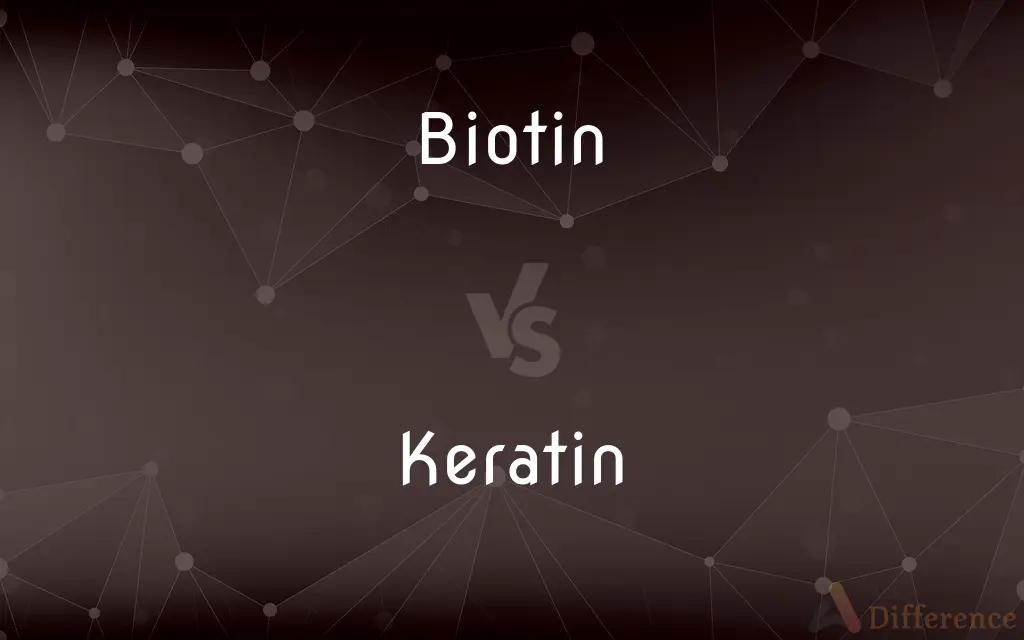Biotin vs. Keratin — What's the Difference?
By Maham Liaqat & Fiza Rafique — Updated on April 16, 2024
Biotin is a water-soluble vitamin essential for metabolic processes, while keratin is a structural protein forming hair, nails, and skin.

Difference Between Biotin and Keratin
Table of Contents
ADVERTISEMENT
Key Differences
Biotin, also known as vitamin B7, plays a critical role in the body’s metabolism by converting food into energy and supporting the health of hair, skin, and nails. Keratin, on the other hand, is a protein that provides structural strength and protection to epithelial cells from stress and damage.
While biotin is consumed through diet and supplements to aid in various bodily functions including hair growth and nail strength, keratin is naturally produced by the body and can also be applied topically in products like hair treatments and creams to improve texture and resilience.
A deficiency in biotin can lead to hair loss, skin rashes, and brittle nails, indicating its importance in cell growth and health. Conversely, damage to keratin (through heat, chemicals, or environmental factors) can lead to weakened hair and nails, emphasizing keratin's role as a protective barrier.
Biotin is often recommended as a dietary supplement to enhance the keratin infrastructure, suggesting a synergistic relationship between the two where biotin supports the body’s ability to produce keratin. Keratin treatments, however, are used to directly replenish and strengthen the external layers of hair and nails.
Both biotin and keratin are popular ingredients in cosmetic and health products aimed at improving the appearance and health of hair, skin, and nails, but they function differently: biotin as a nutrient that supports cell vitality, and keratin as a building block that strengthens and protects these cells.
ADVERTISEMENT
Comparison Chart
Type
Vitamin (B7)
Protein
Role in Body
Metabolic support, cell growth
Structural component, protection
Form of Use
Dietary intake, supplements
Topical treatments, internal production
Deficiency Effects
Hair loss, skin rashes, brittle nails
Weak, brittle hair and nails
Cosmetic Use
Supplements for hair and nails growth
Treatments to strengthen hair and nails
Compare with Definitions
Biotin
Essential for the health of hair, skin, and nails.
Biotin deficiency can lead to hair thinning and loss.
Keratin
A tough, fibrous protein that is a key structural material in the human body.
Keratin is the primary component of hair, skin, and nails.
Biotin
A B-vitamin important for metabolic and cellular health.
Biotin supplements are often prescribed for strengthening hair and nails.
Keratin
Can be damaged by external factors like heat and chemicals.
Over-styling with heat tools can degrade keratin in hair.
Biotin
Available in many foods like eggs, nuts, and grains.
Including biotin-rich foods in a diet supports overall health.
Keratin
Provides strength and protection to cells exposed to stress.
Keratin treatments are used to revitalize damaged hair.
Biotin
Often recommended for metabolic issues.
Biotin can help regulate blood sugar levels in some cases.
Keratin
Produced naturally by the body.
Healthy keratin production is essential for strong hair and nails.
Biotin
Involved in the synthesis of fatty acids and glucose.
Biotin helps in the conversion of food into energy.
Keratin
Used in various cosmetic products.
Keratin conditioners help smooth and strengthen hair.
Biotin
Biotin, also called vitamin B7, is one of the B vitamins. It is involved in a wide range of metabolic processes, both in humans and in other organisms, primarily related to the utilization of fats, carbohydrates, and amino acids.
Keratin
Keratin () is one of a family of fibrous structural proteins known as scleroproteins. α-Keratin is a type of keratin found in vertebrates.
Biotin
A vitamin, C10H16N2O3S, that is a component of the vitamin B complex and is a cofactor in many enzyme systems. It is found in large quantities in liver, egg yolk, milk, and yeast and is used in many biotechnology applications.
Keratin
A fibrous protein forming the main structural constituent of hair, feathers, hoofs, claws, horns, etc.
Biotin
(vitamin) A sulfur-containing member of the vitamin B complex, 5-[(3aS,4S,6aR)-2-oxohexahydro-1H-thieno[3,4-d]imidazol-4-yl]pentanoic acid, found in liver, egg yolk, milk, and yeast, essential to the activity of multiple enzyme systems.
Keratin
Any of a class of filamentous proteins that are abundant in the cytoskeleton of vertebrate epithelial cells and are the main constituents of the outer layer of skin and tough epidermal structures such as hair, nails, hooves, feathers, and claws.
Biotin
A B vitamin (C10H16N2O3S) that aids in body growth; - called also vitamin H and coenzyme R. It functions as a coenzyme in many carboxylation reactions.
Keratin
Material composed principally of keratin proteins.
Biotin
A B vitamin that aids in body growth
Keratin
(protein) The protein of which hair and nails are composed.
Keratin
A sulfur-containing fibrous protein constituting the main structural protein of hard epidermal tissues, such as horn, hair, feathers, nails, claws, hoofs, and the like. It is an insoluble substance, and, unlike elastin, is not dissolved even by gastric or pancreatic juice. By decomposition with sulphuric acid it yields leucine and tyrosine plus various other acid-stable amino acids. The amino acid composition varies, but it usually has a high percentage of cystine, which stabilizes and insolubilizes the protein by forming intrachain linkages. A softer form of keratin is present in the epidermis and whalebone. Called also epidermose.
Keratin
A fibrous scleroprotein that occurs in the outer layer of the skin and in horny tissues such as hair feathers nails and hooves
Common Curiosities
How does keratin benefit the hair?
Keratin strengthens and protects hair, improving its texture and resilience against environmental and chemical damage.
What is the main function of biotin in the body?
Biotin primarily functions in metabolic processes, helping convert food into energy and supporting cellular health.
Can taking biotin supplements boost keratin production?
Yes, biotin supplements can support the body's keratin production by enhancing the health of cells that produce keratin.
Is biotin effective in treating hair loss?
Biotin can be effective in treating hair loss that is due to biotin deficiency, though it might not affect all types of hair loss.
What are the risks of keratin treatments?
Some keratin treatments contain chemicals like formaldehyde, which can pose health risks if inhaled or used improperly.
How do I know if I need more biotin or keratin?
If experiencing hair loss, brittle nails, or skin issues, a doctor can help determine if these are due to deficiencies or damage that biotin or keratin could address.
Can keratin help with skin health?
Yes, keratin plays a crucial role in maintaining the strength and elasticity of the skin.
What are the signs of keratin damage in hair?
Signs include dry, brittle hair, split ends, and overall lack of shine and strength.
How can I include more biotin in my diet?
Eating biotin-rich foods such as eggs, nuts, seeds, and whole grains can increase your biotin intake.
Can biotin and keratin be used together?
Yes, using both can synergistically improve the health and appearance of hair, skin, and nails.
Are keratin treatments safe for all hair types?
Keratin treatments can be beneficial but may not be suitable for all hair types, especially if already damaged or extremely fragile.
Are there vegetarian sources of biotin?
Yes, vegetarian sources of biotin include nuts, legumes, whole grains, and certain vegetables.
Can excessive use of keratin products damage hair?
Excessive or improper use of keratin products can lead to build-up and potential hair damage over time.
What is the difference in the absorption of biotin and keratin in the body?
Biotin is absorbed through ingestion and impacts cellular metabolism, whereas keratin is a structural protein that must be produced internally or applied topically.
How long does it take to see the effects of biotin on hair and nails?
It may take several weeks to months of consistent biotin intake to see noticeable improvements in hair and nail health.
Share Your Discovery

Previous Comparison
Bellow vs. Laugh
Next Comparison
Buddy vs. DudeAuthor Spotlight
Written by
Maham LiaqatCo-written by
Fiza RafiqueFiza Rafique is a skilled content writer at AskDifference.com, where she meticulously refines and enhances written pieces. Drawing from her vast editorial expertise, Fiza ensures clarity, accuracy, and precision in every article. Passionate about language, she continually seeks to elevate the quality of content for readers worldwide.














































